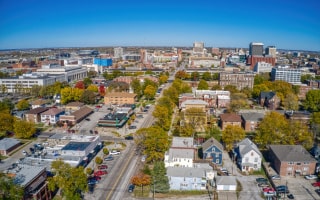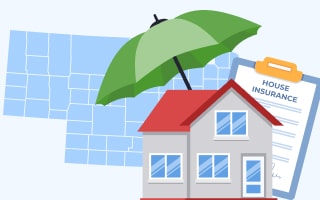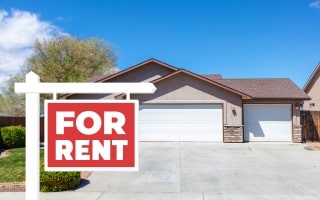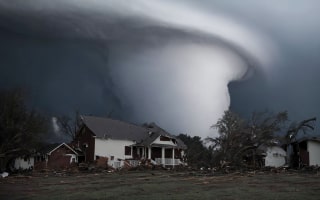Homeowners Insurance in Nebraska

Nebraska is best known for its rolling plains, picturesque grasslands, and wide horizons. Unfortunately, located in the Midwest, Nebraska is also famous for frequent tornadoes, earthquakes, and wildfires. Tornadoes and wildfires are some of the most deadly and costly natural disasters. Nebraska lies directly in what is known as "Tornado Alley", the most threatening area of the country for tornadoes. The state also has plentiful thunderstorms with lightning, which causes damage. Since 1953, Nebraska has had 62 federally declared disasters, and the rate of disaster per 1 million people is 31.18.
Along with natural disasters, Nebraska residents file home insurance claims for flooding, burst pipes, fallen trees, bodily injury, other types of property damage, theft, and medical payments.
States don't require property owners to purchase homeowners insurance, but they highly recommend it. However, if you take out a mortgage to buy the property in Nebraska, your bank will demand that you purchase home insurance and keep it on the property for as long as you have the loan. They will also dictate the coverage levels.
The national average for homeowners insurance is $2,728 a year or $227 per month. With the high risk in Nebraska, residents there pay an average of $5,227 a year for home insurance, which is considerably higher than most states.
Types of Homeowner Insurance Coverage Available in Nebraska
Insurance providers choose whether to operate in specific states, offering various types of coverage. Nebraska is a high-risk state. Therefore, coverage and providers are more limited. The types of coverage available in the state of Nebraska include:
-
Dwelling: Dwelling coverage pays to replace or repair your house after a qualifying event. It protects the home's structure, meaning the walls, roof, foundation, flooring, etc.
-
Other Structures: Other structures insurance will pay to replace detached items outside, such as a pool, fence, shed, garage, and hot tub.
-
Personal Property: Personal property coverage pays to replace your belongings if they are stolen, vandalized, or destroyed in a covered peril.
-
Liability: If anyone gets hurt while on your property, they could sue you. If they do, liability protection pays your legal bills. Say you leave a rake sitting out, and a guest steps on it and is hurt; that is an example of how this insurance works.
-
Medical Payments: When someone gets hurt on your property in Nebraska state, this insurance will pay their medical bills.
-
Additional Living Expenses (ALE): When you are forced to leave your home while it is repaired or rebuilt, ALE insurance will pay for your expenses (food, lodging, travel, pet boarding, furniture rental, etc.).
Floods are also common in Nebraska, which makes flood insurance crucial. Consider adding a special policy to cover floods or an umbrella policy to fill in where the others leave off.
FEMA (Federal Emergency Management Agency) manages the National Flood Insurance Program (NFIP) through a network of 50 providers across the U.S.
Since most homeowners insurance does not cover floods, this supplemental coverage can repair damage and replace items after a flood. Depending on the options you choose, it can cover the building and/or your personal belongings. This program is available to homeowners, renters, and businesses. Learn more about the program on FEMA's website.
Home Insurance and Natural Disasters
Severe weather events are becoming more prevalent across the country. Frequent storms cause enormous damage, which results in claims and losses, which only increase rates. Climate change is the number one factor driving rate increases today. Over the past five years, rates across the U.S. have gone up an average of 34% and even as high as 60% in some locations. In Nebraska, rates have increased by 48.6%, considerably more than in most areas.
Nebraska has some of the most devastating natural disasters possible: tornadoes, earthquakes, floods, and wildfires. These are also among the costliest of insurance claims. Fire and lightning claims cost insurers an average of $77,340. Water damage and freezing cost an average of $11,650, and wind and hail cost an average of $11,695. From 2015 to 2019, Nebraska insurance providers lost a total of $597,052,400. Nebraska has some of the most hail damage claims, and from 2017 to 2019, hail claims totaled 161,374. From 1980 to 2024, Nebraska had 62 billion-dollar disasters. In 2023, Nebraska ranked #5 for most tornadoes (81). In 2022, the state had 568 wildfires, destroying 76,534 acres of land and causing property damage.
How Can I Save on Homeowner Insurance Premiums in Nebraska?
Especially in Nebraska, where rates are going sky-high, homeowners need to find creative ways to save money on premiums. The best way to do that is to understand fully what factors impact insurance rates. In Nebraska, the list of those things are:
-
Location: Your location matters the most. If you live in an area like Nebraska with frequent tornadoes or wildfires, your premiums will be much higher than in a safe place. Additionally, people in cities or high-crime regions will pay more than those in rural or suburban areas, which are generally safer.
-
Size of Your Home: The size of your home also matters. The larger the house, the more it will cost to rebuild, and your rates will increase accordingly.
-
Condition of Your Home: The condition of your home is another crucial factor. Houses in good condition cost less to insure than those in disrepair.
-
Age of Your Home: The age also matters. Newer homes cost less to insure, and older homes cost more.
-
Materials: The materials used to build your home also matter. The more expensive the construction materials, the more expensive your premiums.
-
Coverage Levels: How much coverage you have is crucial. The more you buy, however, the higher your rates will be.
-
Your Deductible: The higher your deductible, the lower your rates. Conversely, the lower the deductible, the higher your rates.
-
Your Claims History: People who file many small claims will pay higher rates than those with a clean claims history.
-
Your Credit Score: Credit also matters. If you have a high credit score, you will get better rates than if you have poor credit.
Some ways to save on home insurance include:
- Make Your House Disaster-Resistant: Making your house more resilient, especially in a place like Nebraska, where there are frequent tornadoes, can lower your insurance rates.
- Bundle Your Policies: Bundle multiple policies to save money on your home insurance rates.
- Raise Your Deductible: Increase your deductible as much as possible, and your insurer will lower your rates.
- Shop Around for Providers: Get recommendations from friends, family, and colleagues and shop around for the best rates.
- Improve Your Credit: Improve your credit and then ask your insurer to re-evaluate your rates. People with good credit get better rates.
- Stay with the Same Carrier: Stay with the same carrier for many years and earn loyalty discounts.
- Avoid High Risks: Get rid of risks on your property and lower your annual premiums.
- Ask for Discounts: Ask your agent about any discounts that you qualify for.
- Improve Home Security: Add a home security system to avoid certain perils and lower your rates.
- Don't File Small Claims: Avoid filing small claims and only file larger ones to keep your rates manageable.
Home Insurance Discounts in Nebraska
Home insurance is a policy that protects your home against certain covered disasters. If a windstorm or fire destroys your home, the insurance will pay to rebuild it. Policies come with certain limits and it's essential to have enough to rebuild it back to its most recent condition.
It's easy to get insured. Find an insurance provider you like and apply by calling them or online through their website. Or you could use a local agent to help you find a policy and the proper coverage for your situation and budget. You will have to pay the first year upfront, then you can pay monthly through your escrow or once a year yourself.
Some standard home insurance discounts offered by most firms include:
- Bundle Discounts: Bundle multiple policies with the same provider, and you'll receive a discount.
- Senior Discounts: Most firms offer senior citizens a break on home insurance rates once they reach a certain age.
- Claims-Free Discount: Remain claims-free for a certain amount of time and earn a discount the longer you go without any.
- Military Discount: Many insurance providers offer veterans or military personnel a discount for their service to the country.
- Occupational Discount: Teachers, firefighters, and others receive discounts for working in a specific occupation.
- Loyalty Discount: Remain a loyal customer to a particular firm and they may discount your rates.
- Payment Method/Paperless Discount: Your carrier may offer a discount if you choose automatic payments or paperless statements.
- Security Discount: Install home security to help avoid claims; as a reward, your provider will discount you.
- Early Quote Discount: Request a quote long before you need it, and you may receive a discount.
- Smart Home Discount: Smart homes can monitor for disasters before they happen. Install specific devices or systems and get a discount.
- Fire Safety Discount: Install fire safety equipment like smoke alarms and sprinklers for a discount on your home insurance.
- New Home Discount: New homes cost far less to insure than older homes.
- Non-Smoker Discount: Get a discount for being a non-smoker and reducing your fire risk.
- Location-Based Discount: People who live in safe locations get discounted rates.
Common Rates Offer by Homeowners Insurance Firms
New homes cost much less to insure (up to 40% off), and homes only five years old earn discounts of up to 26% off. Newer homes are constructed of better, stronger, fire-resistant materials, making them a better risk. The average cost of new home insurance in Nebraska is $2,851, which is far less than the average cost of insurance paid by most residents. Your actual rate will depend on many factors.
Top 10 Home Insurance Firms in Nebraska and Average New Home Savings
| Company | % savings |
|---|---|
| Nationwide | 76% |
| Allstate | 47% |
| American Family | 55% |
| Travelers | 63% |
| Amica | N/A |
| Auto-Owners | N/A |
| Cincinnati Insurance | 52% |
| USAA | 54% |
| Chubb | N/A |
| State Farm | 51% |
Home Insurance and Renovations in Nebraska

Home renovations can drastically enhance your living space and increase the value of your home. However, many of them can impact your home insurance rates significantly. Some upgrades increase the value or risk of your home and your insurance rates. Others may decrease risk and lower your rates, while others will do both simultaneously.
![]() Home Renovations that Increase Rates
Home Renovations that Increase Rates
Some home renovations that increase your rates include:
- Install a Fountain: A fountain can add beauty and elegance to your yard but also increases risk, and you will pay more for your homeowners insurance.
- Upgrade Kitchen/Bath: Updating the kitchen or bath can increase your house's value by 50%, but it will also increase your rates, especially if you choose luxury upgrades.
- Adding a Fireplace: A fireplace can add warmth and glow to your home but also drastically increases your fire risk, increasing your rates.
![]() Home Renovations that Decrease Rates
Home Renovations that Decrease Rates
Some home renovations that decrease your rates include:
- Roof Replacement: Reinforcing your roof to make it more weather-resistant will make your insurance company happy and reduce your rates.
- Siding Replacement: New siding can add years of life to your home and decrease your rates.
- Home Security: Installing home security can help avoid theft and vandalism, and your carrier will discount your rates for this.
Home upgrades are not covered by home insurance. Your homeowners' policy only repairs or replaces your home after a covered peril. However, if someone steals from you or gets hurt while performing the renovation, those things are covered.
It would be best to always discuss any potential renovations with your home insurance agent before starting work. They can help you understand the impact on your rates and coverage.
Nebraska Renters' Insurance

Those who rent apartments, condos, and houses instead of buying also need homeowners insurance. Renters insurance is the product for renters; however, it works differently. First, it does not include any dwelling coverage. That must be covered through the owner's policy. The main goal of renters insurance is to protect personal property and replace items if they are stolen or destroyed in a covered event. Policies also include liability, medical payments, and loss of use coverage.
Renters insurance is priced based mainly on three factors:
-
Location: Even as a renter, your location matters. If you live in the city, you will pay more than if you live in the country. If your area has many weather events, you will pay higher rates.
-
Coverage Limits: The more coverage you buy, the higher your premiums.
-
Number of Units in the Building: The more units in your building, the lower your rates.
The average renters insurance cost in Nebraska is $266/year or $22/month, which is affordable but not the cheapest in the country.
Condo Insurance in Nebraska

Condo owners in Nebraska also need homeowners insurance. Condo insurance works differently than homeowners. Condo developments have a master policy that covers the dwelling of each building. After a qualifying event, the master policy will pay to restore the building back to its original condition (when it was first built). Most condo owners have updated the interior (kitchen, baths, flooring, lights, appliances, etc.), and those items will not be covered. HO-6, or condo insurance, pays to restore the condo's interior back to its most recent condition with all the updates. Condo insurance also includes personal property coverage, liability, medical payments, loss of use, and loss assessment. Unlike renters insurance, which has no dwelling coverage, condo insurance does, but it is limited to "walls-in". The liability insurance only pays if the person was hurt inside the condo.
Some covered perils with condo insurance include fire, theft, windstorm, lightning, etc. The items that condo insurance will replace include:
- Furniture
- Interior Walls
- Wiring/Plumbing
- Flooring
- Cabinets
- Countertops
- Appliances
- Light Fixtures
- Personal Possessions
The average condo insurance rate in Nebraska is $542/year or 45/month for $60,000 in personal property protection, $300,000 in liability protection, and a $1,000 deductible.
Some ways to save on condo insurance include:
- Shop Around/Ask for Recommendations
- Raise Your Deductible
- Bundle Your Policies
- Install Security/Safety Devices
- Improve Your Credit
- Sign Up for Auto Payments or Paperless Billing
- Ask for Discounts
Nebraska Home Insurance Market
Due to Nebraska's precarious location, home insurance providers have lost money for more years than not since 2013. From 2013 to 2023, insurer losses totaled more than $7 billion. Clearly, Nebraska is a tough home insurance market not for the faint of heart. Only providers with a stable financial footing dare operate in Nebraska. If losses continue, however, more providers will pull out of the state, narrowing competition and making it harder for homeowners to find coverage.
Tornadoes are among the most deadly and damaging perils. Unfortunately, Nebraska is directly in the path of many storms that cause wind damage. If the current trend continues, Nebraska insurance carriers will continue to suffer massive losses, and eventually, some may go bankrupt.
Regulating the home insurance industry is left up to each state. State officials appoint a department or agency to monitor all providers and rates to ensure fairness, field customer complaints, perform investigations, and sanction guilty firms. In Nebraska, that agency is the Nebraska Department of Insurance, located at 941 O St., PO Box 82089, Lincoln, NE 68501-2089.
Homeowners Insurance Guide
- Homeowners Insurance in Nebraska
- Types of Homeowner Insurance Coverage Available in Nebraska
- Home Insurance and Natural Disasters
- How Can I Save on Homeowner Insurance Premiums in Nebraska?
- Home Insurance Discounts in Nebraska
- Home Insurance and Renovations in Nebraska
- Nebraska Renters' Insurance
- Condo Insurance in Nebraska
- Nebraska Home Insurance Market
Instant Access to Nebraska Property Records
- Owner(s)
- Deed Records
- Loans & Liens
- Values
- Taxes
- Building Permits
- Purchase History
- Property Details
- And More!
Homeowners Insurance Guide
- Homeowners Insurance in Nebraska
- Types of Homeowner Insurance Coverage Available in Nebraska
- Home Insurance and Natural Disasters
- How Can I Save on Homeowner Insurance Premiums in Nebraska?
- Home Insurance Discounts in Nebraska
- Home Insurance and Renovations in Nebraska
- Nebraska Renters' Insurance
- Condo Insurance in Nebraska
- Nebraska Home Insurance Market